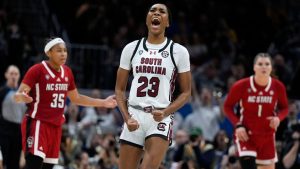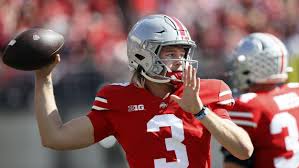
Caitlin Clark turns down the NBA All-Star 3-point contest, gaining respect from WNBA legend Sheryl Swoopes
Caitlin Clark, the sensational college basketball player at the University of Iowa, continues to make waves in the basketball world. Known for her electrifying performances and sharpshooting abilities, Clark has taken the NCAA women’s basketball scene by storm. Her decision to turn down an invitation to participate in the NBA All-Star 3-point contest has sparked significant conversation across various basketball circles, including praise from the legendary WNBA icon Sheryl Swoopes. This move not only underscores Clark’s maturity and focus on her goals, but also highlights the evolving relationship between the women’s and men’s basketball worlds.
Caitlin Clark: A Phenomenal Talent
At just 22 years old, Caitlin Clark has already solidified herself as one of the most accomplished players in college basketball history. Her ability to score from anywhere on the court, particularly her deep three-point shooting range, has captured the attention of fans, analysts, and basketball players alike. She is known for her fearless style of play, high basketball IQ, and incredible work ethic. Clark’s success has not only set records but has also set a new standard for how women’s college basketball is perceived.
Clark’s impact is multifaceted. Beyond her statistical accomplishments, she has become a role model for young athletes, particularly young women, showing them that they can aspire to greatness in a sport that has traditionally been dominated by men. Her playing style — characterized by long-range shooting, deep step-back threes, and exceptional ball-handling — is reminiscent of NBA stars, which is a testament to her talent and ability to compete at the highest level.
The NBA All-Star 3-Point Contest Invitation
It is within this context that Caitlin Clark’s decision to turn down the invitation to participate in the NBA All-Star 3-point contest is so noteworthy. The 3-point contest, held annually during the NBA All-Star Weekend, features some of the most talented shooters in the league, with past participants including NBA legends like Stephen Curry, Ray Allen, and Klay Thompson. The contest is an exciting, high-profile event that garners significant attention from both basketball fans and the general public.
Clark, despite her immense shooting talent, decided to decline the opportunity to compete in the contest. Her reasoning for doing so was rooted in a desire to maintain her focus on her current commitments at the University of Iowa. Clark is currently in the midst of a standout college season, leading her team to a promising position in the NCAA tournament. The decision to not participate in the contest aligns with Clark’s priorities and her commitment to her collegiate career.
Though many fans and media outlets were excited about the prospect of seeing Clark take on NBA stars in the 3-point contest, her decision was met with understanding from various quarters, including WNBA legend Sheryl Swoopes. In an era where athletes are often under intense pressure to participate in as many events as possible, Clark’s decision to prioritize her team and college season speaks volumes about her character and focus.
Sheryl Swoopes: A Legend Weighs In
Sheryl Swoopes is one of the most influential players in women’s basketball history. A three-time WNBA MVP, four-time WNBA champion, and a pioneer for women’s sports, Swoopes has long been a vocal advocate for the recognition and respect of women’s basketball. When she weighed in on Caitlin Clark’s decision to turn down the NBA 3-point contest, her words carried immense weight.
Swoopes expressed her admiration for Clark’s maturity in handling the situation. She recognized that Clark’s decision was a testament to her understanding of the bigger picture — her collegiate career, her responsibility to her teammates, and her ambition to continue elevating the women’s game. In Swoopes’ view, Clark’s decision showcased not just her talent, but also her sense of responsibility and focus on long-term success.
“Caitlin is not just a phenomenal player, she’s a smart player,” Swoopes said in an interview. “She knows what’s important to her, and she’s not letting anything distract her from her goals. That’s a level of maturity that you don’t see from a lot of young athletes. She’s paving the way for others in a way that’s incredibly inspiring.”
Swoopes’ support of Clark’s decision highlights a broader narrative within the women’s sports community. Female athletes often find themselves walking a fine line between pursuing individual accolades and remaining committed to their team and league. In many cases, the pressure to capitalize on personal opportunities for visibility can be overwhelming. However, Clark’s decision to remain focused on her college career and turn down the NBA’s offer is a powerful statement about the importance of dedication and discipline in the pursuit of excellence.
The Importance of Prioritizing College Basketball
Caitlin Clark’s decision also emphasizes the importance of college basketball in the development of female athletes. While the allure of the NBA All-Star Weekend and the chance to showcase her talent on a global stage might have been tempting, Clark’s choice to turn down the contest is indicative of her commitment to collegiate athletics. College basketball offers an environment where players can develop their skills, refine their game, and contribute to their team’s success — all while balancing the academic and social aspects of college life.
For Clark, playing for the University of Iowa and representing her school is a point of pride. She understands the significance of her role as one of the best players in college basketball and the impact she has on the sport. Turning down the opportunity to participate in the 3-point contest allowed her to stay true to her current goals — helping her team succeed in the NCAA tournament and continuing to build her legacy as one of the greatest to ever play college basketball.
In this regard, Clark’s decision also serves as a reminder that there is a different type of pressure in women’s sports. Female athletes often don’t have the same access to media coverage or endorsement deals as their male counterparts. As such, the spotlight that Clark is currently under is not solely focused on her performance in the All-Star Weekend festivities, but on her long-term goals within the context of women’s basketball. By turning down the 3-point contest, Clark not only demonstrates maturity but also highlights the need for women’s college basketball to be given its own platform for recognition and growth.
The Broader Implications for Women’s Sports
Clark’s decision also sends a powerful message about the evolving landscape of women’s sports and how they are increasingly recognized for their talent and potential. The fact that an invitation to the NBA All-Star 3-point contest was extended to a college female athlete speaks volumes about the growing respect and recognition of women’s basketball. It reflects a shift in how women’s sports are viewed by the general public and the basketball community at large.
For too long, female athletes, particularly in basketball, were overlooked and dismissed by mainstream media. However, as women’s basketball has grown in visibility and popularity, more and more opportunities have emerged for female players to showcase their skills on larger platforms. Caitlin Clark is at the forefront of this movement, and her decision to decline the invitation is a reminder that women’s sports are not just about participation but about strategic career choices and thoughtful decision-making.
Moreover, the respect that Clark has earned from figures like Sheryl Swoopes underscores the mutual support within the women’s basketball community. Women’s athletes often have a stronger sense of camaraderie and solidarity, as they continue to fight for equal recognition in a male-dominated sports culture. By prioritizing her college basketball career over personal fame and glory, Clark is not only protecting her future but also contributing to the greater good of women’s sports as a whole.
Looking Ahead: Caitlin Clark’s Future
As Caitlin Clark continues her career at Iowa and beyond, the eyes of the basketball world will remain on her. Her talent is undeniable, and her future prospects are bright, whether she decides to play professionally in the WNBA or pursue other opportunities. One thing is certain: Clark’s decision to turn down the NBA 3-point contest is just another example of her maturity and focus on what truly matters to her.
Her decision also serves as an inspiration to young athletes everywhere, teaching them the importance of making thoughtful choices that align with their goals and values. Whether they are pursuing a career in college athletics or dreaming of playing professionally, Clark’s example shows that success is not just about seizing every opportunity, but about knowing when to stay the course and maintain focus on the bigger picture.
As the landscape of women’s basketball continues to evolve, Caitlin Clark will undoubtedly play a pivotal role in shaping the future of the sport. And, with the continued support of athletes like Sheryl Swoopes, the respect for women’s basketball will only continue to grow.





